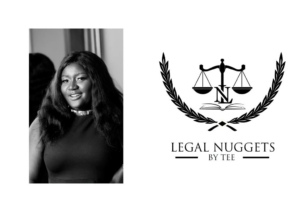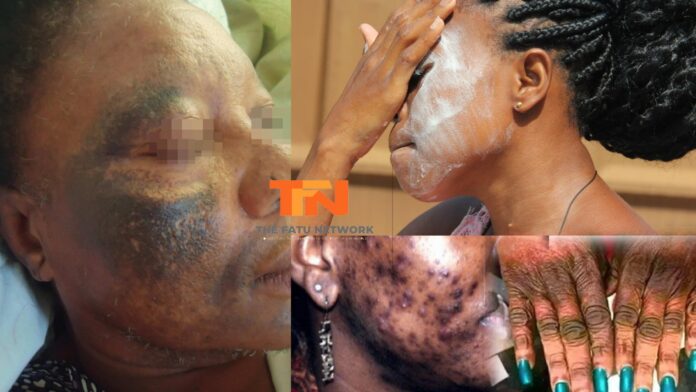By: Juliana Twumwaa Obeng
The Writer

DID YOU KNOW THAT BLEACHING YOUR SKIN IS A CRIME?
Did you know that it is a criminal offence to bleach your skin?
Yes, in The Gambia, and most parts of the world, it is an offence that is punishable by law.
Skin bleaching, also known as skin lightening or whitening, toning in a more millennian term, is a practice that involves using products or treatments to lighten or even out skin tone. It is a controversial issue that has been the subject of many debates and discussions in recent years.
Some people choose to bleach their skin for cosmetic reasons, in order to achieve a lighter or more uniform skin tone. Others do it because they believe that lighter skin is more socially acceptable or that it will improve their chances of success in life.
Moreover, skin bleaching has been associated with self-esteem issues and a lack of self-acceptance. It reinforces the belief that lighter skin is more desirable or superior, which can lead to discrimination and prejudice against those with darker skin.
It is important to note that skin bleaching is not just a personal choice but is also influenced by societal norms and expectations. This can lead to a cycle of discrimination and social exclusion for those who do not conform to these beauty standards.
In many countries, skin-bleaching products are widely available and heavily marketed, perpetuating the idea that lighter skin is more desirable.
The legal perspective
To start with, several countries have enacted laws to regulate the sale and use of skin-bleaching products. One such country is The Gambia, which passed the Skin Bleaching Act in 1995. An Act prohibiting and restricting the use, sale, importation and possession of certain listed creams or substances for skin bleaching.
This law prohibits the importation, distribution, and sale of any cosmetic product or agent designed to lighten the skin tone. It also prohibits the advertisement and promotion of skin-bleaching products.
Under this law, anyone found guilty of breaking these regulations faces a fine of up to 50,000 Dalasis or imprisonment for a term not exceeding two years, or both. This means that, in the Gambia, it is a criminal offence to use, buy, sell or import bleaching creams into the Gambia without a permit from the appropriate authorities. And you can be fined or sentenced to a prison term if found guilty by the courts.
The law also allows for the confiscation and destruction of any skin-bleaching product found in violation of the regulations. The law provides that when skin-bleaching products are found on you, apart from taking you to court, the products are seized and destroyed.
The Act also requires a prescription for the purchase of bleaching creams. This means that in the Gambia, you would need a prescription form signed by a medical practitioner before purchasing any bleaching product.
The Skin Bleaching Act of The Gambia is just one example of how governments are taking action to regulate skin bleaching. Other countries, including South Africa and Ghana, have also taken steps to regulate the sale and use of skin bleaching products.
While skin-bleaching may be a personal choice, it has been linked to various health risks, and several countries have taken steps to regulate the sale and use of skin-bleaching products. The Skin Bleaching Act 1995 of The Gambia is one such law that prohibits the importation, distribution, and sale of any cosmetic product or agent designed to lighten the skin tone. Anyone found guilty of breaking these regulations faces a fine or imprisonment, or both.
The writer is a BL candidate at the Gambia Law School. She is driven by her affinity to the legal profession and relies on Precedents and Acts of the National Assembly to educate the public on bits and pieces of the application of the Laws of the Gambia and Ethics of the legal profession. These write-ups are for educational purposes only and not to serve as a substitute for Legal Advice. Email: [email protected]
References:
- Adebajo, S. (2018). Skin bleaching: A public health concern. The Lancet Global Health, 6(7), e715-e716. Dlova, N. C., Hamed, S. H., Tsoka-Gwegweni, J., & Grobler, A. (2015).
- Skin bleaching advertisements and the misrepresentation of black women’s identity: A call for a policy change in South Africa. South African Medical Journal, 105(12), 1000-1001.
- World Health Organization. (2011). Skin bleaching and its health implications. https://www.who.int/ipcs/assessment/public_health/mercury_flyer.pdf
- Skin Bleaching Act 1995 of The Gambia: http://extwprlegs1.fao.org/docs/pdf/gam10011.pdf
- Regulation of skin bleaching products in South Africa: https://www.tandfonline.com/doi/full/10.1080/15569527.2019.1603293









